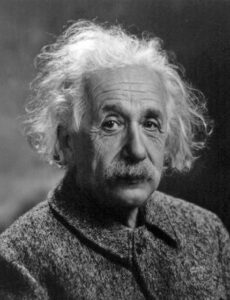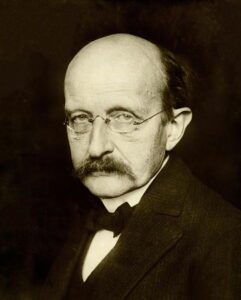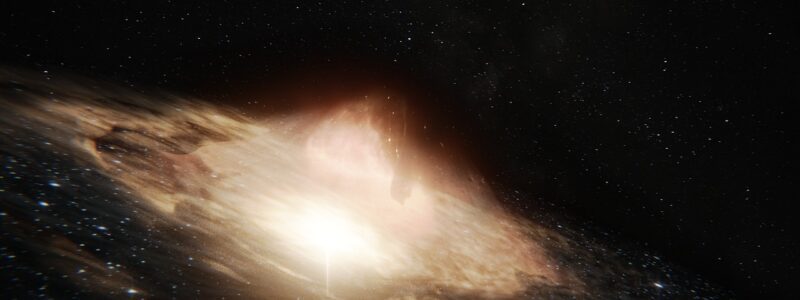The Laws of Nature
The Laws of Nature as defined by Antony Flew represent the great order of the universe. That there should be such order from a universe that originated from the Big Bang defies explanation and is one of the reasons why the atheist philosopher who fought for most of his life for atheism came to belief in God.
Antony Flew was a British philosopher who was a popular atheist philosopher throughout most of the twentieth century. In that capacity, he taught philosophy at some of the best-known colleges in the United Kingdom including Oxford, Aberdeen, and York University in Toronto.
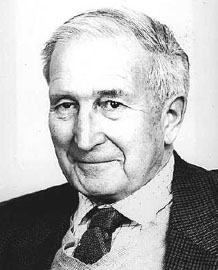
Antony Flew – By عبد الله الصيدلي at Arabic Wikipedia – Transferred from ar.wikipedia to Commons., Public Domain, Link
Flew was a strong advocate for atheism during most of his long career arguing that atheism should be the presupposed position of belief until there was sufficient evidence otherwise. He was one of the signatories of the Humanist Manifesto in 2003 which has been used as source material for secular and atheist ethics. The basic tenants of the Humanist Manifesto are listed as these:
- Knowledge of the world is derived by observation, experimentation, and rational analysis. (See empiricism.)
- Humans are an integral part of nature, the result of unguided evolutionary change.
- Ethical values are derived from human need and interest as tested by experience. (See ethical naturalism.)
- Life’s fulfillment emerges from individual participation in the service of humane ideals.
- Humans are social by nature and find meaning in relationships.
- Working to benefit society maximizes individual happiness
Flew held many debates with theists over multiple decades arguing there was no empirical evidence for the existence of God, and there seemed to him to be considerable evidence against theism. He was particularly concerned with the “problem of evil” in that how could a good God allow such natural evil as exists on Earth.
In 2004, the year after he signed the Humanist Manifesto, Flew astonished the atheist world by announcing at the beginning of the debate that he was no longer an atheist but would be taking the theist position. This article will discuss one of the reasons why Flew came to the conclusions he did; namely, the argument from design.
Flew came to believe the advancement of science pointed strongly to empirical evidence for a Designer – for a type of Intelligent Design argument. He was particularly impressed with the design of the Universe and design of life from using both empirical scientific evidence as well as through philosophical considerations. He wrote,
I have since come to see that … this argument [argument to design] when correctly formulated, … constitutes a persuasive case for the existence of God. Developments in the two areas in particular have led me to this conclusion. The first is the question of the origin of the laws of nature and the related insights of eminent modern scientists. The second is the question of the origin of life and reproduction.
Natural Law
Natural law is defined by Flew as regularity or symmetry in nature. These might include,
- Boyles law stipulating that, given constant temperature, the product of the volume and pressure of a fixed quantity of an ideal gas is constant,
- Newton’s first law of motion that an object at rest will remain at rest unless acted upon by an external and unbalanced force; an object in motion will remain in motion unless acted upon by an external and unbalanced force,
- Thermodynamics with the conservation of energy, such that the total amount of energy in an isolated system remains constant.
Flew emphasizes that the important point is not just that there are these laws of nature, but that they are mathematically precise, universal, true across the universe, and “tied together.” Einstein spoke of these laws of nature as “reason incarnate.” The question is why should this be the case; Flew notes that eminent scientists throughout the centuries like Newton, Einstein, and Heisenberg have asked these very questions and answered it was due to the Mind of God.
Few also noted these considerations have troubled not only scientists of the premodern era but also contemporary scientists such as Stephen Hawking. He ends his A Brief History of Time with these considerations,
If we discover a complete theory, it should in time be understandable by everyone, not just be a few scientists. Then we shall all, philosophers, scientists and just ordinary people, be able to take part in the discussion of the question of why it is that we and the universe exist. If we find the answer to that, it would be the ultimate triumph of human reason – for then we should know the mind of God.
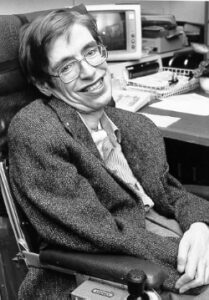
Stephen Hawking
Hawking also noted in a later interview,
The overwhelming impression is one of order. The more we discover about the universe, the more we find that it is governed by rational laws. You still have the question: why does the universe bother to exist? If you like, you can define God to be the answer to that question.
Flew notes that Einstein also realized the theistic implications of the beauty of mathematics and physics in the design of the universe. Einstein noted,
I’m not an atheist, and I don’t think I can call myself a pantheist. We are in the position of a little child entering a high library filled with books in many languages. The child knows someone must have written these books. It does not know how. It does not understand the languages in which they are written. The child dimly suspects a mysterious order in the arrangement of the books but doesn’t know what it is. That, it seems to be, is the attitude of even the most intelligent human being toward God. We see the universe marvelously arranged and obeying certain laws but only dimly understand these laws. Our limited minds grasp the mysterious force that moves the constellations.
Einstein also noted,
Every one who is seriously engaged in the pursuit of science becomes convinced that the laws of nature manifest the existence of a spirit vastly superior to that of men, and one in the face of which we with our modest powers must feel humble.
Flew knew that Einstein believed God manifested himself “in the laws the universe as a spirit vastly superior to that of man, and one in the face of which we without modest powers must feel humble.
Quantum Physics and God
The great physicists discovering the laws of quantum physics also were often great believers in God. These include Max Planck, Werner Heisenberg, Erwin Schrodinger, and Paul Dirac.
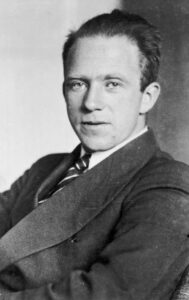
Werner Heisenberg – By Bundesarchiv, Bild 183-R57262 / Unknown author / CC-BY-SA 3.0, CC BY-SA 3.0 de, Link
For example, Werner Heisenberg became famous for the development of what is called the Heisenberg uncertainty principle. He noted,
In the course of my life, I have repeatedly been compelled to ponder on the relationship of these two regions of thought [science and religion], for I have never been able to doubt the reality of that to which they point.
Heisenberg also noted,
Max Planck, the physicist who unfolded the entire quantum universe, unambiguously held that science and religion complement each other. He noted,Wolfgang [Pauli} asked me quite unexpectedly: “Do you believe in a personal God?” … “May I rephrase your question?” I asked. “I myself should prefer the following formulation: Can you, or anyone else, reach the central order of things or events, whose existence seems beyond doubt, as directly as you can reach the would of another human being. I am using the term ‘soul’ quite deliberately so as not to be misunderstood. If you put your question like that, I would say yes. … If the magnetic force that has guided this particular compass – and what else was its source but the central order? — should ever become extinguished, terrible things may happen to mankind far more terrible even that’s concentration camps and atom bombs.
There can never be any real opposition between religion and science; for the one is the complement of the other.
He also noted,
Religion and natural science are fighting a joint battle in an incessant, never relaxing crusade against skepticism and against domatism, against unbelief and superstition … [and therefore] “On to God?”
Why These Laws of Nature
Flew goes on to consider more fully the laws of nature that drive our existence; without them – or with some other laws – we would not exist.
Paul Davies is arguably the most influential expositor of modern science. He considers the relationship between the rationality of nature and the Mind of God. Davies notes that the laws of nature are not readily apparent but have to be extracted by difficult science, mathematics, and experimentation.
Davies notes the ‘burning question’ concerning the laws of nature is threefold,
Where do the laws of physics come from?
Why is it that we have these laws instead of some other set?
How is it that we have a set of laws that drives featureless gases to life, consciousness, and intelligence?
Paul Davies notes these laws of nature seem
contrived – fine-tuned, some commentators have claimed – so that life and consciousness may emerge.
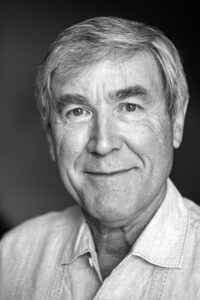
Paul Davies – By Cmichel67 – Own work, CC BY-SA 4.0, Link
He concludes that this
contrived nature of physical existence is just too fantastic for me to take on board as simply ‘given.’ It point to a deeper underlying meaning to existence.
Davies was troubled by the atheist notion that the laws of nature exist reasonlessly and that there is no reason for the existence of the universe – it just is. Davies noted,
As a scientist, I find this hard to accept. There must be an unchanging rational ground in which the logical, orderly nature of the universe is rooted.
Summary
Antony Flew was a philosopher who thoroughly professed the atheist viewpoint that there was no empirical evidence for the existence of God. However, he always left open the possibility that he might change his opinion should the advancement of science produce such evidence.
That transformation did indeed happen during 2004 when he announced his conversion to theism. The reason for this extraordinary change is purported to be found in the evidence of science and not in advances of philosophy. This is important, as philosophy is not an empirical enterprise based on observation and experiment as is (or at least should be) science.
This article considered the beauty and universality of the laws of science. Many of these laws have only been uncovered in the last one hundred years since the extraordinary work of Einstein in the early twentieth century. The complexity of life will be out next consideration.
In that article, Flew considers “How did Life go Live?”

